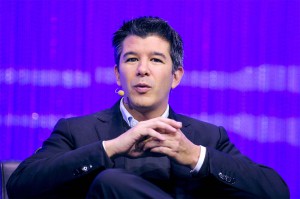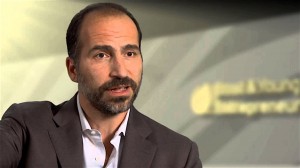Didi Chuxing Technology Co., China’s dominant ride-hailing company, which recently raised more than $4 billion in fresh capital, is increasing its presence in South America with the acquisition of Brazil’s top ride-sharing service, increasing the pressure on its principle rival, Uber, which continues to face legal challenges on all sides.
Meanwhile, reports indicated that Travis Kalanick, Uber’s founder and former CEO, is preparing to sell 29% of his stake as part of deal with Japan’s SoftBank. The deal could net Kalanick, who was forced to leave his post as CEO last year, an estimated $1.4 billion from the deal. Kalanick still owns 10% of Uber’s stock.
Also selling Uber shares is Benchmark, a venture capital firm, which is reportedly moving 15% of its holdings worth about $900 million. Both Kalanick and Benchmark will retain seats on the Uber board, according to reports.
The buyer of both stakes is an investment consortium led by SoftBank, the Japanese conglomerate, which recently agreed to buy $10 billion of Uber stock through a private placement.
(Uber taking more lumps over evasive tactics. Click Herefor the story.)
During the past year, Uber’s top management has been largely replaced, following allegations of sexual harassment inside the company, incidents of covering up information from regulators, and failure to disclose a hack attack that stole driver and passenger information.
Benchmark led the company’s Series A financing round in 2011 and the company has made the firm a tremendous amount of money and the decision to sell some of their earnings will weaken its power in company decision-making, but also locks in some of their winnings ahead of an uncertain IPO in 2019.
The venture capital firm said in August that its analysis “shows Uber could comfortably be worth over $100 billion in just two years.” In the SoftBank deal, however, Uber’s stock is being sold at a significant discount that valued the company at $48 billion.
At the same time Uber’s has continued to spawn costly litigation in a variety of jurisdictions.
A former Uber security specialist has accused the company of dispatching a team of spies to steal its rivals’ trade secrets and using shady tactics to thwart its competition in the ride-hailing market, according an inflammatory letter unsealed last by a federal judge in San Francisco.
Those tactics allegedly included impersonating other people, illegally recording conversations and hacking into computers.
(Click Here for more about Uber losing its big court case in London.)
Former Uber manager Richard Jacobs, who was fired earlier this year, made the explosive claims in a 37-page letter that sought a big payoff for being forced out of the company. The letter, written by a lawyer on Jacobs’ behalf, has already reshaped a high-profile trial pitting Uber against Waymo, a Google spinoff that accuses its rival of stealing its self-driving car technology.
The letter also has become evidence in a criminal investigation being conducted by the U.S. Justice Department.
U.S. District Judge William Alsup, who is overseeing the Waymo-Uber case, has recommended that federal prosecutors consider a criminal probe, based on the evidence and testimony that he had reviewed even before Jacobs’ letter was unsealed in court.
Although many of Jacobs’ most damaging allegations were aired in court hearings held two weeks ago, the put more light on the free-wheeling culture that Kalanick encouraged.
The scandals spawned under Kalanick have now become a major source of embarrassment for Uber as it tries to recast itself as a better-behaved company under a new management team led by Dara Khosrowshahi and in the face of intense competition from rivals such as Lyft and Didi.
Uber’s ugly reputation also has hurt its dealing if overseas markets around the world where the battle for ride-sharing dominance will ultimately be decided.
(To see more about Uber’s criminal probe due to “espionage,” Click Here.)
“While we haven’t substantiated all the claims in (Jacobs’) letter – importantly, any related to Waymo – our new leadership has made clear that going forward we will compete honestly and fairly, on the strength of our ideas and technology,” Uber said in a Friday statement.


